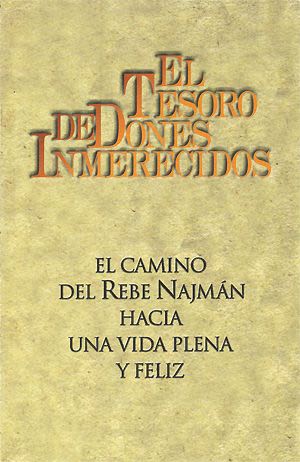
The Supernal Light
How many sincere souls have already abandoned the ranks of Torah spiritual struggle because of the weight of their imperfection and the profound...

How many sincere souls have already abandoned the ranks of Torah spiritual struggle because of the weight of their imperfection and the profound remorse that this caused them?
“The Baal Shem Tov taught that every individual could attain a strong, personal relationship with God.
Rebbe Nachman expanded this concept, teaching that the most powerful method to attain such a relationship with God is personal prayer in one’s own native language.” (Aryeh Kaplan, Jewish Meditation)
How many sincere souls have already abandoned the ranks of Torah spiritual struggle because of the weight of their imperfection and the profound remorse that this caused them? This is so unfortunate. If they had only overcome this hurdle, their future would have been far more enviable; in the long run they would have surmounted all difficulties. A person cannot engage in a spiritual struggle if he has not first felt the responsibility to do so. To feel it as a task is to conceive the notion of duty; this undertaking is my responsibility, I must perform it. If I do so, I will receive my just reward; if I fail, I will have to make reparations. Hence our satisfaction when we feel that we have done our duty, and our anxiety when we feel that we have failed. This concern, this feeling experienced when we have fallen short in performing our responsibility, is also called compunction. The good thing about remorse is that it leads to repentance, then to reparation, provided, however, that it is controlled, felt in its right measure.
What happens if remorse is excessive? It becomes an obsession and leads to paralysis. It becomes increasingly heavy, even unbearable, and soon leads to a complete depression and giving up on everything. This absurd path has led us from one extreme to the other, from extreme piety to complete renunciation. So many sincere believers have deserted because of their over-excessive remorse; this case is far more frequent than one might think.
Here is not the place for discussion of the other extreme, that of simply shaking off one’s responsibilities. As we said in our introduction, we are addressing ourselves here to those who wish but cannot. Our aim is to offer a harmonious way that will allow them to reconcile remorse and optimism, a sense of responsibility balanced with joy.
If we have just committed a serious transgression, let’s disregard it right now. Let’s apply the advice given in the previous chapter. We shall start over as if nothing had happened, as if we were discovering the Torah spiritual struggle for the first time. In this way we will overflow with joy and optimism. We must categorically refuse to allow ourselves to be tortured by any type of anxiety whatsoever. We have to think only of acting positively now, of doing what we can.
Then, at a moment of the day or night that we have chosen, we will arrange to sit down with our conscience and have a reckoning. We shall isolate ourselves, stand alone before our Maker, take stock of our actions, and direct this introspective session towards Him. We will confess our transgressions to Him: this is very important. We will tell Him how sorry we are and ask Him to help us to avoid repeating the same offenses again, to show us how to get out of this rut. This is the most important thing. Then, as our heart is cleansed of the bitterness of the transgressions, a profound serenity will take its place. This will be the light that will help us to better discern the possible solutions.
This marvelous method of meditation is called Hitbodedut in Hebrew, from the root bod which literally means alone; it has been extensively explained in Aryeh Kaplan’s Meditation and Kabbalah, Outpouring of the Soul and Jewish Meditation.
The reader will understand by himself the benefit of this most complete and effective path: it harmonizes love and fear. It channels one’s anxieties and stress. It reconciles even the most wayward children with their Father who awaits them. It ties the heart of the transgressor, however low he has sunk, to the infinite love of his Maker awaiting him on-high. It expresses unquestionably our desire to do better and by this very fact brings us into a higher state of consciousness where everything is transmuted into positive.
Then, when this moment of introspection, scrutiny and elevation has been fulfilled, we will return light-hearted to our task, and turn over the page once more in order to throw ourselves into action again.
All the stages of this method are described and developed in Aryeh Kaplan’s books. Nonetheless we will relate some basic points here:
* This applies to all levels, whether you are at a very high moral stage or a very low point. The actual act is not difficult. There is nothing that really keeps us from it.
* Our conversation must be formulated in our mother tongue, so that we can fully pour out our heat without any language barrier. Because it is an unstructured kind of meditation, it should be as spontaneous and colloquial as possible.
* In order for this method to bear fruit, efforts must be made to apply it daily, for a length of time varying according to our possibilities and our needs. It could be considered as an important date, for it is truly one.
* Rebbe Nachman firmly recommended secluding oneself in either meadows or forests, among plants and trees, for they also raise up their praise to the Lord and will be thrilled to join their song to ours. Nevertheless, all places are suitable, including one’s bed, as mentioned in Tehillim (Psalms) by Dovid Hamelech (King David).
* If you are prevented, by inhibition, by timidity, from expressing yourself, say at least the few words that you can – until God helps you and sends you a flood of ardent words within which you will find the answers to your greatest problems. Aryeh Kaplan rightly referred to the traditional expression “Ribono Shel Olam” (Master of the Universes as Rebbe Nachman’s mantra. It is recommended for those who feel inhibited to converse fluently with their Maker. To repeat those words for countless thousands of times.
* Stumbling blocks will certainly appear. Do not give way. Persist. Then, with regular practice, you will understand Rebbe Nachman’s sentence: “Hitbodedut – Meditation is an elevated value, the greatest of all!”
* * *
When a contrite man confesses his wrong-doings to God and repents for having distanced himself so greatly, the Divine Presence joins this man in his prayer. The Divine Presence also suffers the consequences of all our transgressions. However, when we truly regret them, the Divine Presence comforts us and seeks ways of helping us.
* * *
In many cases, we may well know what we must do, but we lack the strength or the means to do it. It is here that the highest form of prayer has its place: to transform the teaching into supplication.
For instance, if we learn that calumny is a serious transgression, that it turns our heart from the Torah and hardens it, we know that the only solution is to no longer slander, to keep our teeth and lips tightly sealed. But then comes the trial: a “friend,” for instance, comes to confide in us the troubles and aberrations of another person, and we feel ourselves powerless to resist listening to such confidences. What should we do? We shall transform the precepts of the Torah – “You shall not be a talebearer among your people” – into a request: “O God, help me to avoid gossip and slander! Allow me to distance myself from those who indulge in this and to have the courage to remain silent . . .”
We may lack the strength to resist evil, but we can always pray. When the Almighty hears such a prayer, He showers us with His mercy and will help us not to stumble. The most famous model of this practice is the book of Tehillim (Psalms). Almost every verse is a plea of Dovid Hamelech who seeks to draw closer to God and to fulfill the Torah. This book is divided into five volumes, corresponding to the five books of the Torah. How wise it is to devote a part of our search to the fervent reciting of Tehillim.
* * *
The Offering of the Soul
“Take with you words and return to the Lord!” said the Navi (Prophet). The Sages heard in this marvelous sentence the voice of the Lord whispering: “My children, all I ask from you is only to take words and bring them to Me!”
In the time of the Temple, there were all kinds of rituals that allowed the believers to draw near to God or to redeem their transgressions – bulls, calves, sheep and turtledoves were sacrificed to these ends. These sacrifices were in fact the means of coming closer to the Source of all lives that allowed us to receive the energy we need to get through the ordeals of this world.
However, in the case of a poor man who did not have the financial wherewithal to make such an offering, the Torah said: “When a soul will offer a meal offering, it should be of fine flour . . .”
This humble offering, albeit a little flour, is nonetheless a fully-fledged sacrifice; moreover, it is the only one where the expression a soul, is used. Rashi explains that “God considers this sacrifice as a sacrifice of self, and offering of the soul.”
What exactly is the poor man’s merit that the Torah confers such a noble rank on him? Why does the Torah refer to him as a soul, an expression that appears for no other sacrifices?
The greatness of this poor man, the feat that he accomplishes by bringing his meal offering, is his humility!
In the House of Splendor, resounding with the melodies of the Levites, thronging with the festive crowds, gleaming with gold, silver and copper, abounding with cattle, and filled with sublime fragrances, the poor man hastens with his small bowl of flour: if he was conceited, he would have stayed home. Since he did not have the means to purchase an honorable offering, he could have been ashamed, and could have remained hidden. However, overcoming his humiliation, he decided, nonetheless, to draw near to God in his fashion and according to his means. He braves the glances of others and silences his hear in order to present before God the fruit of his sincere ardor. He really does offer up his soul!
A universal principle, applicable for all time: when someone feels devoid of spiritual value, poor in good deeds and wisdom, he must recognize his deficiencies: this is the starting point. However, he must not be crushed by this realization; it must not prevent him from seeking the means to advance, resource within his reach. For if he felt extreme shame due to his poverty, he would sink into resignation and would become even more belittled. On the contrary, he must rely on the infinite goodness of the Almighty, the immense love that He bears for us, giving hope to each one of us, however poor or debased we may be!
The proof: the sacrifice of the poor man that the Torah raises to the highest rank!
God’s kindness knows no bounds. It transforms the most desperate situations into unexpected salvation. It welcomes and cherishes our humblest initiatives provided that we strip ourselves of any wrongly placed pride and that we offer, at least, the little that we possess.
When a person who has gone astray decides to pick himself up, to mend his ways, even if he cannot express his remorse as penitents did formerly (for instance, he does not have the strength to concentrate on appropriate introspection not to perform rectification such a fasting, etc.), he should not abandon the idea of doing at least the little that he can!
The smallest step, the slightest initiative is immensely precious in the eyes of our Maker. It is the offering of the poor man that God loves dearly and calls a precious fragrance.
Today we no longer have our “House of Glory.” We are still in exile. Our offering, however, will be replaced by our prayers and sacrifices.
All the nations that lost their glory sank into decline and disintegrated. It was the end of one empire or another, this civilization or that. The Jewish people lost its “House of Glory.” Nonetheless, it did not disintegrate, because is applied the principle of the meal offering: “I can no longer offer glorious sacrifices. At least I will pray!”
This applies to all of us, each at our own level: “I cannot utter a perfect prayer? At least I will pray in my own way.”
The most beautiful prayers are those uttered by the poor, “Prayer of the afflicted, when he is overwhelmed, and pours out his lament before the Lord.” Certainly, he pours it out, as one spills water, seemingly without great conviction, without special fervor. But he forces himself to do so, because it is all that he can do: How God cherishes this prayer! By this means, the poor man attains the goals that he has set for himself: to restore contact with his Father!
We must never give up, never resign ourselves. Even if we are spiritually poor, morally destitute, let us raise ourselves up, bring at least a little flour, a few good words; let us bring a meal offering.
The words of the Torah are timeless, universal. In each generation, our guides perceive in the Divine message what applies to us today, to us, and how to realize it. They show the relationship that exists between the spirit of the text, and our personal situation.
The Messiah, for whom we await, is called a poor man who rides on a white donkey. We learn from this that the Redemption depends on the way in which we have been “poor.” In other words, we must recognize our situation, but we must not despair.
Our teachers have not been authorized to reveal to us completely the extent of the goodness and mercy of our Father. However, they have shown us its effects. One, who wishes to redeem the spark of glory that lies within him, can understand that despair is absurd. He will not be ashamed to pray even defectively. His efforts will then attain immeasurable dimensions.
(Used with permission from COURAGE by Israel Isaac Besancon. Published by Shir Chadash Publishers).













Tell us what you think!
Thank you for your comment!
It will be published after approval by the Editor.